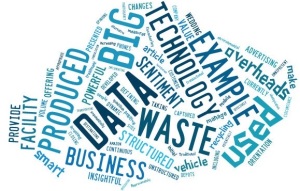For many years the recycling and environmental sectors have lagged behind many other industries in their application of technology. Having now worked in IT for a quarter of a century I thought it was time to reflect on what the real benefits of technology are, and then predict how different technologies may be adopted in this sector over the coming year. To put it in simple terms, technology (when implemented correctly) brings one of two benefits; it either improves efficiency or it provides reliable and appropriate information upon which better decisions can be made. I have chosen five technologies that fall into one or both of these categories, and I would predict that at least four of them will be a hit during 2014. What do you think, hit or miss? Continue reading
put it in simple terms, technology (when implemented correctly) brings one of two benefits; it either improves efficiency or it provides reliable and appropriate information upon which better decisions can be made. I have chosen five technologies that fall into one or both of these categories, and I would predict that at least four of them will be a hit during 2014. What do you think, hit or miss? Continue reading
Category Archives: bigdata
Tesco Club Card can aid Smart Cities
Just read the Smart City article in the Resource Efficient Business magazine (www.rebnews.com) for October. It’s a good read. Sad bloke that I am, I was  looking in my own bins wondering how much potentially recyclable material we as a family put into the general waste bin – quite shocking really, I will have a word with myself. Continue reading
looking in my own bins wondering how much potentially recyclable material we as a family put into the general waste bin – quite shocking really, I will have a word with myself. Continue reading
Big Data
Big Data is omnipresent, yet relatively unknown. It is a technology that affects our everyday lives in so many ways, though most of us do not know it exists. In this blog I attempt to uncover a phenomenon that has become pervasive in many aspects of life and is now impacting, amongst others, the waste, recycling and environmental sectors.
Before offering some insight into what Big Data is, let’s put forward a few examples that are easy to relate to: A 20’s something female updates her relationship status on Facebook from single to engaged. She then begins to see subtle (and sometimes less than subtle) advertising for wedding dress shops, romantic holiday destinations and even hotels in her home vicinity that offer the full wedding package. Now, Facebook do not  employ huge teams of data ninjas that monitor your every change in circumstance to then present you with appropriate advertisements, they employ Big Data. Recently, a piece of research from Cambridge University and Microsoft across 58,000 volunteers demonstrated a remarkable ability to predict a person’s age, gender, political affiliation and even sexual orientation just from their “Likes” on Facebook. Apparently clicking “Like” on subjects such as “Britney Spears” or “Desperate Housewives” were among the signs of homosexual orientation! Continue reading
employ huge teams of data ninjas that monitor your every change in circumstance to then present you with appropriate advertisements, they employ Big Data. Recently, a piece of research from Cambridge University and Microsoft across 58,000 volunteers demonstrated a remarkable ability to predict a person’s age, gender, political affiliation and even sexual orientation just from their “Likes” on Facebook. Apparently clicking “Like” on subjects such as “Britney Spears” or “Desperate Housewives” were among the signs of homosexual orientation! Continue reading
